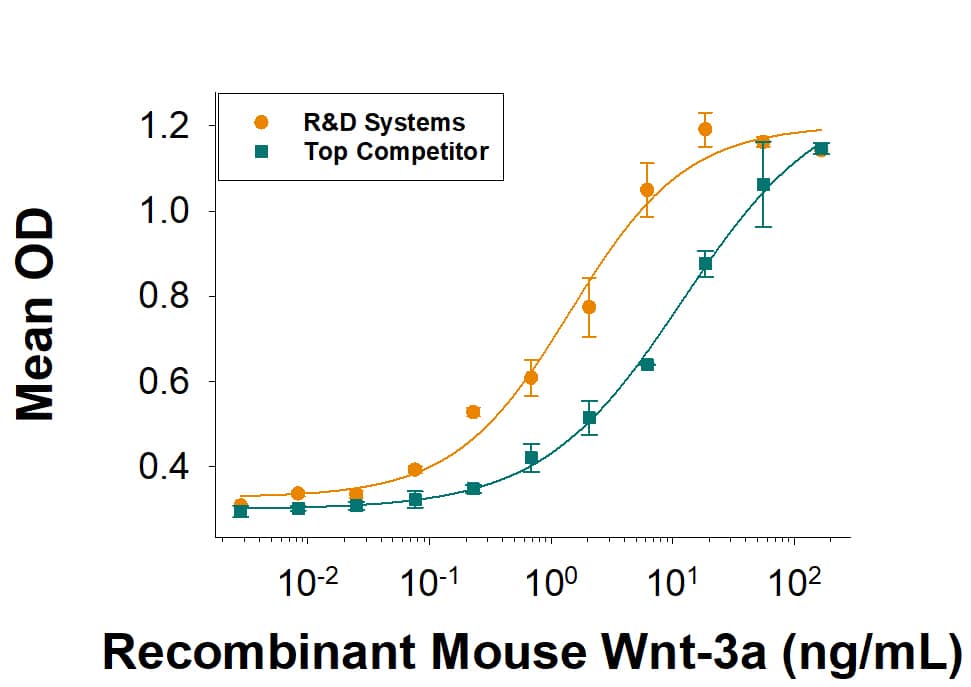Recombinant Mouse Mast Cell Protease-1/Mcpt1 Protein, CF
Recombinant Mouse Mast Cell Protease-1/Mcpt1 Protein, CF Summary
Product Specifications
Glu19-Lys246, with a C-terminal 10-His tag
Analysis
Customers also Viewed
Product Datasheets
Carrier Free
CF stands for Carrier Free (CF). We typically add Bovine Serum Albumin (BSA) as a carrier protein to our recombinant proteins. Adding a carrier protein enhances protein stability, increases shelf-life, and allows the recombinant protein to be stored at a more dilute concentration. The carrier free version does not contain BSA.
In general, we advise purchasing the recombinant protein with BSA for use in cell or tissue culture, or as an ELISA standard. In contrast, the carrier free protein is recommended for applications, in which the presence of BSA could interfere.
5146-SE
| Formulation | Supplied as a 0.2 μm filtered solution in Tris and NaCl. |
| Shipping | The product is shipped with polar packs. Upon receipt, store it immediately at the temperature recommended below. |
| Stability & Storage: | Use a manual defrost freezer and avoid repeated freeze-thaw cycles.
|
Assay Procedure
- Activation Buffer: 50 mM MES, 50 mM NaCl, 5 mM DTT, pH 5.5
- Assay Buffer: 50 mM Tris, 2 M NaCl, 0.025% (w/v) Brij-35, pH 8.0
- Recombinant Mouse Mast Cell Protease‑1/Mcpt1 (rmMcpt1) (Catalog # 5146-SE)
- Recombinant Mouse Active Cathepsin C/DPPI (rmCathepsin C) (Catalog # 2336-CY)
- Heparin (Sigma, Catalog # H3393), 20 mg/mL stock in deionized water
- N-Ethylmaleimide (NEM) (Sigma, Catalog # E1271), 50 mM stock in deionized water
- Substrate: SUC-Ala-Ala-Pro-Phe-AMC (Bachem, Catalog # I-1465), 10 mM stock in DMSO
- F16 Black Maxisorp Plate (Nunc, Catalog # 475515)
- Fluorescent Plate Reader (Model: SpectraMax Gemini EM by Molecular Devices) or equivalent
- Dilute rmCathepsin C to 120 µg/mL in Activation Buffer.
- Dilute rmMcpt1 to 200 µg/mL in Activation Buffer.
- Dilute Heparin to 160 µg/mL in Activation Buffer.
- Combine 15 µL of 200 µg/mL rmMcpt1, 15 µL of 120 µg/mL rmCathepsin C and 30 µL of 160 µg/mL Heparin. Mix well.
- Incubate reaction mixture for 2 hours at 37 °C.
- Dilute NEM to 10 mM in Assay Buffer.
- Stop activation by adding 60 µL of 10 mM NEM.
- Dilute activated rmMcpt1 to 8 ng/µL in Assay Buffer.
- Dilute Substrate to 200 µM in Assay Buffer.
- Load into a plate 50 µL of 8 ng/µL rmMcpt1, and start the reaction by adding 50 µL of 200 µM Substrate. Include a Substrate Blank containing 50 µL of Assay Buffer and 50 µL of 200 µM Substrate.
- Read at excitation and emission wavelengths of 380 nm and 460 nm (top read), respectively, in kinetic mode for 5 minutes.
|
Specific Activity (pmol/min/µg) = |
Adjusted Vmax* (RFU/min) x Conversion Factor** (pmol/RFU) |
| amount of enzyme (µg) |
*Adjusted for Substrate Blank
**Derived using calibration standard 7-Amino, 4-Methyl Coumarin (AMC) (Sigma, Catalog # A-9891).
- rmMcpt1: 0.4 µg
- Substrate: 100 µM
Background: Mast Cell Protease-1/Mcpt1
Mast cell protease-1 (Mcpt1), also known as beta ‑chymase, is a member of the Chymase family of chymotrypsin-like serine proteases (1). mMcpt1 is a mast cell protease predominantly expressed in intestinal mucosal mast cells where it promotes mucosal permeability in intestinal allergic hypersensitivity reactions (2). Its activation is completed by the removal of a two residue N‑terminal propeptide by a dipeptidyl peptidase (Cathepsin C) (3). Like human alpha ‑Chymase, Mcpt1 is capable of the conversion of angiotensin I to angiotensin II, which plays a key role in the regulation of arterial pressure (4). Studies have shown that specific chymase inhibitors are able to diminish the development of abdominal aortic aneurysm and reduce the adhesion formation after cardiac surgery in hamsters (5, 6). Therefore, the development of specific inhibitors of chymase activity has been a pharmacologic strategy to develop therapeutic agents.
- Caughey, G.H. (2004) in Handbook of Proteolytic Enzymes (ed. Barrett, et al.), p. 1531 Academic Press, San Diego.
- Wastling, J.M. et al. (1998) Am. J. Pathol. 153:491.
- Murakami, M. et al. (1995) J. Biol. Chem. 270:2218.
- Saito, K. et al. (2003) Biochem. Biophys. Res. Commun. 302:773.
- Tsunemi, K. et al. (2004) J. Pharmacol. Exp. Ther. 309:879.
- Soga, Y. et al. (2004) J. Thorac. Cardiovasc. Surg. 127:72.
Citation for Recombinant Mouse Mast Cell Protease-1/Mcpt1 Protein, CF
R&D Systems personnel manually curate a database that contains references using R&D Systems products. The data collected includes not only links to publications in PubMed, but also provides information about sample types, species, and experimental conditions.
1 Citation: Showing 1 - 1
-
The Complement System Is Essential for Arteriogenesis by Enhancing Sterile Inflammation as a Relevant Step in Collateral Artery Growth
Authors: Zhu, A;Baur, C;Götz, P;Elbs, K;Lasch, M;Faro, A;Preissner, KT;Deindl, E;
Cells
Species: Mouse
Sample Types: In Vivo
Applications: In vivo assay
FAQs
No product specific FAQs exist for this product, however you may
View all Proteins and Enzyme FAQsRecombinant Enzymes
Reviews for Recombinant Mouse Mast Cell Protease-1/Mcpt1 Protein, CF
There are currently no reviews for this product. Be the first to review Recombinant Mouse Mast Cell Protease-1/Mcpt1 Protein, CF and earn rewards!
Have you used Recombinant Mouse Mast Cell Protease-1/Mcpt1 Protein, CF?
Submit a review and receive an Amazon gift card.
$25/€18/£15/$25CAN/¥75 Yuan/¥2500 Yen for a review with an image
$10/€7/£6/$10 CAD/¥70 Yuan/¥1110 Yen for a review without an image





